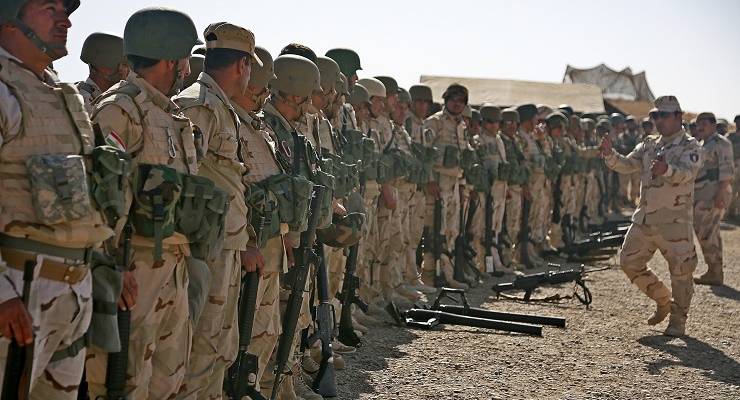
Preparations for a Turkish invasion of north-east Syria, aimed at removing the Kurdish-led Syrian Democratic Forces (SDF) in the area, are complete. According to SDF, the shelling has already started. This follows Donald Trump’s withdrawal of US troops from the area, accompanied by an explicit green light for Turkey’s actions.
The Kurds are the largest ethnic group in the world without a state of their own. There are 30 to 40 million of them dispersed throughout the Middle East, concentrated at the point where the north of Iraq and Syria cluster into Turkey’s east and Iran’s west, up into a patch of south-west Armenia. They have faced repression at the hands of Turkish nationalists, religious discrimination in Shia-dominated Iran (Kurds are largely Sunni), political repression in Syria, and genocide in Iraq.
The SDF has called Trump’s abandonment a “stab in the back”. But this is far from the first time the Kurdish people have been betrayed by their Western “allies”.
1920: As the Ottoman Empire crumbled after World War I, Western allies made provision for a Kurdish state in the 1920 Treaty of Sevres. However, due to protests by the new Turkish state, the promise was discarded by the time the Treaty of Lausanne set the boundaries of modern Turkey three years later.
1972-1975: In 1972, US president Richard Nixon and national security adviser Henry Kissinger agreed to finance and arm an Iraqi Kurdish insurrection against Saddam Hussein. This was a favour to the Iranian Shah, who was engaged with Iraq in a border dispute. Three years later Kissinger endorsed the Algiers Accord between Iran and Iraq, and American and Iranian support for the Iraqi Kurds dried up.
A 1976 report by the House Select Committee on Intelligence describes what happened next: “The insurgents were clearly taken by surprise. Their adversaries, knowing of the impending aid cut-off, launched an all-out search-and-destroy campaign the day after the agreement was signed.”
The Kurds appealed to the US for help. It never came.
1991: A US-led coalition swiftly liberated Kuwait from Saddam Hussein’s invading forces. It is aided by Kurdish and Shiite uprisings in Iraq that it actively encouraged. But Hussein was left in power, and the Kurdish and Shiite rebellions were crushed. More than 1.5 million Kurds fled their homes in the aftermath, fearing a reprise of the 1988 attack that saw Saddam use chemical weapons against Kurdish civilians.
Under international pressure, the US made the reluctant decision to enforce a “no-fly zone” over Kurdish territory in northern Iraq. Tellingly, under this protection, the Kurds transformed the devastated region into an autonomous and “relatively free and functional society”.
2012-present: The spread of ISIS across southern Syria and northern Iraq drew Kurdish populations in those areas into the conflict. After the Iraqi army was routed, Kurdish Peshmerga forces replaced them. The Kurdish-led Syrian Democratic Forces, as part of an Arab coalition and supported by US airstrikes, managed to drive ISIS back.
Yet here we are again. Apart from the moral concerns over yet again abandoning its ally, many in the Trump administration worry that, with the SDF forced to defend itself against Turkey, ISIS will have a chance to regroup.
For our part, Australia’s Defence Minister Linda Reynolds has said it is unlikely Australia will intervene to help relatives of Australians in the area — Kurdish or otherwise.








The Kurdish group who are located in Syria have not announced any independence bid. Their support for their tribal relatives in Turkey is what has got them in the shit. They need to shut up and get back into their previously harmonious Syrian multi tribal society.
I really doubt the Kurds could have prevented Turkey getting all expansionist with the right messaging.
Worth remembering that pre Erdogan the PKK was coming into the fold. When elections went against Erdogan including parties that were representative of Kurdish interests, he pretty much annulled the election. Erdogan is more the problem than the Kurds and I don’t think he gives a toss about ISIS, certainly they did little to hinder them initially, thinking they might help destabilise Syria. The Kurds were the only military group in Iraq or Syria with the skill and courage to take ISIS on and this is our thanks to them? Once more Trump is following his tower sites, backing Turkey. Trump is also aiding Russia’s middle east influence.
If this is how the Trump administration treats the loyal allies that fought and died alongside its troops in Syria, then what are they going to do to us if China or Indonesia decide that Australia is an impediment to their security or their expansion?
They will build a wall around Alice Springs and stay there forever.
Trump said that the Kurds only ‘helped’ to fight isis in Syria because he gave them heaps of money. Is this correct?
“Trump said” says it all.
I wonder how much of the Ramsay Centre for Western Civilisation course this lesson in ‘Western Civilisation’ will take up.